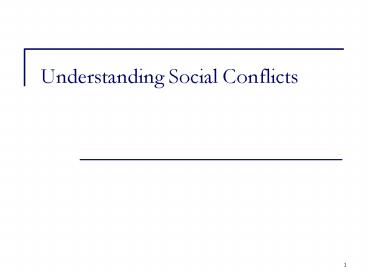Understanding Social Conflicts - PowerPoint PPT Presentation
1 / 16
Title:
Understanding Social Conflicts
Description:
Answer: conservative thesis. Inequality is a part of the natural or divine order of things. ... Conservative thesis rulers. Radical antithesis ruled. 14 ... – PowerPoint PPT presentation
Number of Views:69
Avg rating:3.0/5.0
Title: Understanding Social Conflicts
1
Understanding Social Conflicts
2
Overview of Framing Theory
- How individuals come to understand, characterize,
and act upon their interpretations of a
particular social conflict or dispute. This
includes - - process we use to interpret whats at
stake- how we organize our knowledge about the
world - - how we use this knowledge to make sense of
new information, events, or experiences
3
Theory continued
- Frames are collections of perceptions and
thoughts (our assumptions based upon prior
knowledge/experience). - We apply these to determine what is important and
what is not.
4
Theory continued
- We often frame complex issues to simply them.
- This may lead us to ignore whatever doesnt fit
within our frame. - This process is often unintentional and
unconscious.
5
Theory continued
- By learning about framing, we become more
conscious and able to engage in a meaningful way
with conflict resolution.
6
Types of Frames Identity Frame (Who am I)
- Group identityExample prayer in schools
(conflict) - Social role identityExample soldier in Iraq
(conflict) - Place-based identityExample land use initiative
(conflict)
7
Types of Frames Characterization (Who are they?)
- How we respond to others heavily influenced by
personal experience with them - Example water quality dispute (conflict)resident
s (us) vs. chemical plant (them)chemical plant
(us) vs. residents (them) - Negative characterizations create divisions and
allegiances lead to group think
8
Types of Frames Risk
- How we come to evaluate and respond to the
potential risks associated with a given policy
decision. - Laypeople and experts often conflict on levels of
risk. - Regardless of scientific assessment. We tend to
judge risks more harshly when they- are
voluntary (i.e. you move near a chemical plant)-
inequitable (more pollution in one area than
another)- potentially catastrophic- not well
understood
9
Types of Frames Views of Nature
- Turn on the following questionsShould the
environment be used for human benefit?Should
the environment be protected? - Can the environment regenerate itself?
10
Types of Frames Fact Frames
- Facts do not speak for themselves they require
presentation and interpretation. - Fact frames can be divided into two categories
- information producers (experts) - information
users (all others)
11
Conflict Resolution
- To resolve conflicts, we need to understand how
we tend to frame the issue - Next, consider challenging our assumptions with
this frame - Consider how others frame the conflict
- Seek common ground
12
Example from reading Worlds Apart
- Problem inequality exists
- Question how much inequality is necessary?
- Answer conservative thesisInequality is a part
of the natural or divine order of things. - Answer radical antithesisEquality is the
natural or divine order of things.
13
Who has a stake in this argument?
- Group Identity and Social Role Frames
- Conservative thesis rulers
- Radical antithesis ruled
14
Social Contract (resolution)
- Power (political authority) comes from the
governed not from divine right. - Documents of reform- Declaration of
Independence- US Constitutionand- Adam Smiths
Inquiry into the Nature and Causes of the Wealth
of Nations
15
Smiths assertion
- Instead of the authoritarian economic rule of
kings, an invisible hand of the market place
(unfettered trade/commerce) would organize
society. - 21st Century Criticism despite the success of
markets, they are increasingly controlled by
concentrated power held by corporate monopolies.
16
Borah Symposium Resource Wars
- All events SUB Ballroom at 7 p.m.
- Monday, March 27
- Oil and Water Conflict over Resources
- Tuesday, March 28Recognition of Responsibility
Cooperation or Conflict - Wednesday, March 29Collapse How societies
choose to fail or succeed































